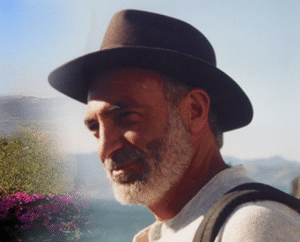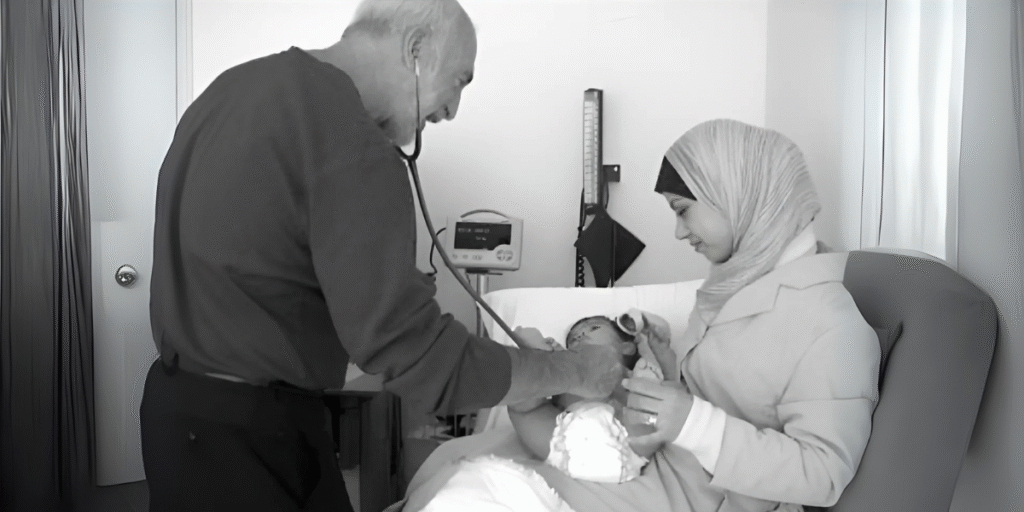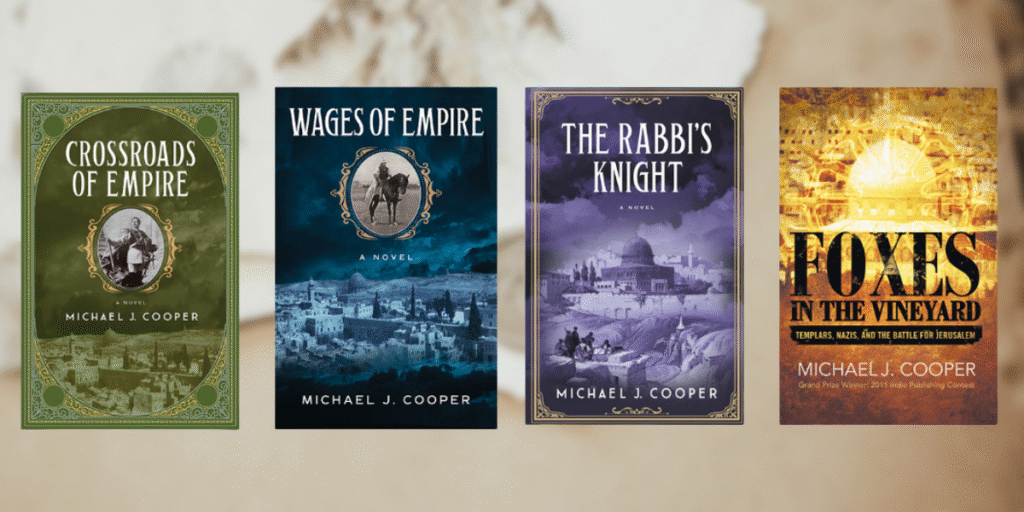Dr. Michael J. Cooper uses his historical fiction to reflect on the complexities of identity, reconciliation, and hope in the Holy Land.
In 1966, a young man from Berkeley, California, embarked on a journey that would forever intertwine his life with the complex history of the Holy Land. Michael J. Cooper, at the time fresh out of high school, emigrated to Israel with a heart full of idealism and a vision shaped by his deep Zionist beliefs. It was a time when Jerusalem was still a divided city, a city where, as fate would have it, he would spend his formative years and establish connections that would later inspire his writing. Today, Dr. Cooper is not only a retired pediatric cardiologist but also an acclaimed author whose historical fiction shines a light on the nuances of identity, conflict, and the possibility for coexistence in the Middle East.
Dr. Cooper’s life has always been shaped by dual callings: healing hearts as a doctor and telling stories that bridge divides. After immigrating to Israel, he studied biology at Hebrew University and graduated from Tel Aviv University’s Medical School. His years in Israel were not just an academic endeavor but a time of deep personal and cultural immersion. He traveled the region, formed lasting friendships, and even worked in the West Bank, gaining invaluable insights into the lives of Palestinian people. These early experiences proved to be formative, sowing the seeds of the unique perspective that would later inform his writing.
Though his career in medicine would span four decades, Dr. Cooper’s connection to the Middle East never waned. He continued to return to Israel and the West Bank, volunteering his medical expertise to treat Palestinian children without access to the care they needed. This humanitarian work, ongoing for more than 20 years, is a testament to his commitment to reconciliation and peace in the region.
The inspiration for Dr. Cooper’s historical fiction came in the aftermath of the assassination of Israeli Prime Minister Yitzhak Rabin in 1995. That tragic event spurred him to channel his grief and disillusionment into writing. His novels are not just historical recounts but narratives woven with a deep understanding of the human condition, shedding light on the complex relationships between different peoples in the Holy Land.
Dr. Cooper’s debut novel, Foxes in the Vineyard, set against the backdrop of 1948 Jerusalem, explores the intricacies of espionage, love, and mysticism in the period surrounding the birth of the state of Israel. The novel won the grand prize in the 2011 Indie Publishing Contest, a significant milestone that heralded Dr. Cooper’s future success as a historical novelist. This recognition set the stage for his subsequent works, each drawing from his personal connection to the region and his deep knowledge of its history.
In Wages of Empire, Dr. Cooper delves into the complex dynamics of WWI-era Ottoman Palestine, weaving a coming-of-age story that captures the tensions of the period. The novel won the 2022 CIBA Rossetti Award for YA fiction, and it garnered first-place honors for the 2022 CIBA Hemingway Award for wartime historical fiction. A sequel, Crossroads of Empire, continued the journey, receiving the 2023 First Place CIBA Hemingway Award and further solidifying Dr. Cooper’s reputation as a masterful storyteller. Both novels highlight not just the historical events of their times but also the enduring relevance of their themes of identity, conflict, and the quest for peace.
His current novel, The Rabbi’s Knight, was released in the first week of September 2025. Set in the 13th-century Holy Land at the twilight of the Crusades, this gripping tale stands alone while also serving as a prequel to Wages of Empire. Within its pages, Dr. Cooper continues his exploration of history through the lens of personal stories that transcend time, weaving together diverse cultures and faiths.
What makes Dr. Cooper’s writing stand out is the way he blends rigorous historical research with a profound empathy for the people of the region. His novels do not simply recount the struggles of the past; they connect those struggles to the present, illustrating the ongoing relevance of the themes he tackles. His work is not just about examining historical events, but about understanding the heart of the people who lived through them.

Dr. Cooper’s novels are recognized for their engaging plots, rich historical detail, and compelling characters. In a review for The Rabbi’s Knight, the Historical Novel Society praised his ability to build suspense and tell a riveting story while also delivering a powerful message of peace and reconciliation: “With a common goal, all people of good faith can work together to find solutions.” Likewise, Andrew Kaplan, New York Times bestselling author of Homeland, called Wages of Empire “masterful storytelling” that keeps readers “furiously turning the pages.” Crossroads of Empire has been celebrated for its “exquisite prose” and “pulsating action,” making Dr. Cooper’s novels must-reads for fans of historical fiction with an eye toward the contemporary.
Dr. Cooper’s work is a powerful testament to the ability of storytelling to create understanding and bring about meaningful change. His writing bridges cultural divides, offering a voice to those who have long been marginalized or silenced. In The Rabbi’s Knight, set at the end of the Crusades in 1290, Cooper introduces a remarkable young woman who defies societal norms and shapes the course of the story. Rather than be forced into the role of serving in an emir’s harem, she takes refuge in a leper colony, where she rises as an intelligent, strong, and beautiful heroine. The story is driven by her determination, intellect, and courage.
In an age when only “high-born” women were often highlighted in literature, Cooper places this fiercely independent woman at the center of his narrative, showing a respect for women’s strength and agency. Through her, The Rabbi’s Knight is not only a historical tale but also a call for a future where empathy, understanding, and cooperation transcend division and conflict. It’s a book that highlights the importance of women, not as secondary characters but as powerful individuals capable of shaping their destinies.
Dr Cooper’s novels are a reflection of his deep respect for women, ensuring that they are seen, respected, and valued in their own right, regardless of their historical or social status.

Living now in Northern California with his wife and their beloved pets, Dr. Cooper continues to draw inspiration from his deep ties to the Holy Land. His passion for both his medical work and his writing is matched only by his commitment to creating a more peaceful world. His novels stand as a testament to the hope that even in the most divided of times, there is always a path toward understanding and coexistence.
Call to Action:
For readers seeking more than just historical fiction, Dr. Michael J. Cooper’s works offer an immersive experience that not only entertains but also educates and inspires. His novels, rooted in the rich history of the Holy Land, provide a timeless exploration of conflict, identity, and hope. Explore Dr. Cooper’s books today and discover how history and fiction intertwine to deliver profound messages of peace. Visit Michael J. Cooper’s Website for more information and updates on his upcoming releases.
Social Media Links:
